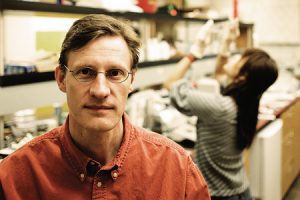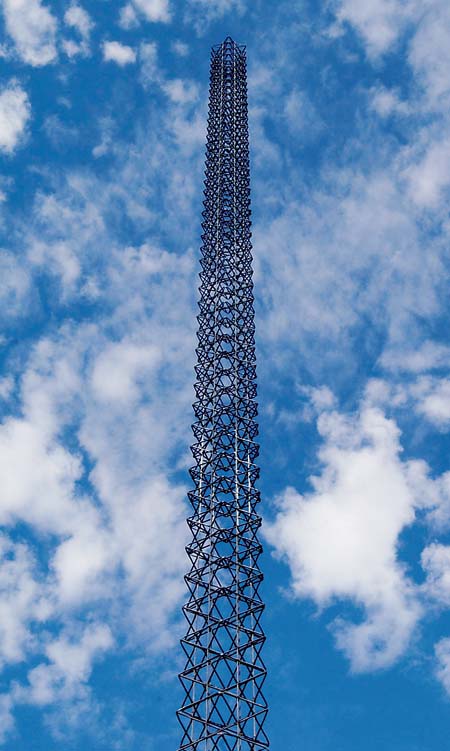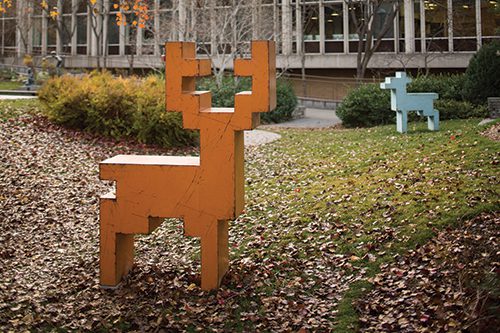One professor is finding ways to capture a protein that could be key in preventing liver cancer.
Posing like the Heisman Trophy, clutch a football against the upper-right portion of your abdomen. In this spot, beneath your diaphragm and next to your stomach, is a pigskin-sized organ—your liver—where if cancer ever developed, the prognosis would be grim.
“Usually what happens with liver cancer is you don’t know you have it; you just start feeling lousy,” says chemistry professor Adam T. Woolley (BS ’92). “You go to a doctor . . . and sure enough . . .” By then the symptoms have set in—fatigue, loss of appetite, abdominal pain and swelling—and they are usually indicative of far worse: a tumor that is beyond current treatment options. But if liver cancer could be detected earlier, an if that is at the heart of Woolley’s nationally recognized research, the disease could plausibly be eliminated.
Last November, Woolley received the Presidential Early Career Award for Scientists and Engineers for his research on cancer marker proteins. It is the first such award given to a BYU professor. Now the National Institutes of Health is funding Woolley’s continued research to develop new tools for analyzing proteins, namely the alpha-feto protein (AFP) that correlates with liver cancers.
AFPs aren’t all bad—a concentration of the protein in a mother’s bloodstream is actually a fetal-wellness marker during pregnancy. In a non-pregnant patient, however, enough AFPs in the bloodstream denote liver cancer.
“We envision taking a blood sample and using the miniaturized tools we’re developing to detect AFP and quantify it,” Woolley says. “In an ideal world, you’d go to the doctor’s office for a healthy checkup, and this would be part of a routine blood-sample analysis.”
That analysis would be performed entirely on one transparent chip, no larger than 2 by 3 inches—a “next-generation device” that Woolley says could revolutionize the expense and frequency of cancer screening.
Embedded in the core of this plastic chip are tubes so tiny they look like scratches. “The way we make them actually uses some of the tricks they’ve developed for making computer circuits,” Woolley says. Utilizing the clean room in the Clyde Building’s Integrated Microelectronics Lab, Woolley and his students imprint grooves into a piece of plastic. Then, through a novel bonding technique developed by Woolley and former student Ryan T. Kelly (BS ’01), the imprinted plastic is bonded to another piece of plastic, encasing the grooves and creating tubes inside the chip—into which blood serum samples can be inserted for testing.
But that’s not all. Woolley and collaborating BYU professors have developed ways to put “functional elements” inside those strand-of-hair-sized tubes, elements that function as sieves, sifting out everything in a blood serum sample except the protein of interest—AFP. One such element is made with antibodies; when a blood serum sample is pushed through the tube, the antibody gloms on to any AFPs present in the sample. “Everything else goes off to waste,” says Woolley. What’s left is a nearly pure, concentrated, and countable sample of AFPs—which could make the difference between beginning cancer treatment immediately or 10 years too late.
“With the combination of tools packaged on a single device like this,” says Woolley, holding up his transparent chip, “we can look at selected [proteins] that have fairly low concentrations in biological samples because we have the ability to concentrate them on a chip.”










